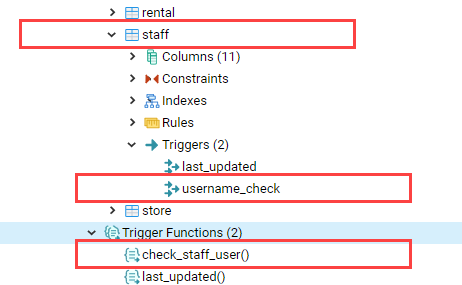Summary: in this tutorial, you will learn how to use the PostgreSQL DROP TRIGGER statement to drop a trigger from a table.
Introduction to PostgreSQL DROP TRIGGER statement
To delete a trigger from a table, you use the DROP TRIGGER statement with the following syntax:
DROP TRIGGER [IF EXISTS] trigger_name
ON table_name
[ CASCADE | RESTRICT ];Code language: SQL (Structured Query Language) (sql)In this syntax:
- First, specify the name of the trigger you want to delete after the
DROP TRIGGERkeywords. - Next, use
IF EXISTSto conditionally delete the trigger only if it exists. Deleting a non-existing trigger without specifying theIF EXISTSstatement results in an error. If you useIF EXISTSto delete a non-existing trigger, PostgreSQL issues a notice instead. TheIF EXISTSis optional. - Then, specify the name of the table to which the trigger belongs. If the table belongs to a specific schema, you can use the schema-qualified name of the table such as
schema_name.table_name. - After that, use the
CASCADEoption to drop objects that depend on the trigger automatically. Note thatCASCADEoption will also delete objects that depend on objects that depend on the trigger. - Finally, use the
RESTRICToption to refuse to drop the trigger if any objects depend on it. By default, theDROP TRIGGERstatement usesRESTRICT.
In SQL standard, trigger names are not local to tables so the DROP TRIGGER statement does not have the table to which the trigger belongs:
DROP TRIGGER trigger_name;Code language: SQL (Structured Query Language) (sql)PostgreSQL DROP TRIGGER statement example
First, create a function that validates the username of a staff. The username is not null and its length must be at least 8.
CREATE FUNCTION check_staff_user()
RETURNS TRIGGER
AS $$
BEGIN
IF length(NEW.username) < 8 OR NEW.username IS NULL THEN
RAISE EXCEPTION 'The username cannot be less than 8 characters';
END IF;
IF NEW.NAME IS NULL THEN
RAISE EXCEPTION 'Username cannot be NULL';
END IF;
RETURN NEW;
END;
$$
LANGUAGE plpgsql;Code language: SQL (Structured Query Language) (sql)Second, create a new trigger on the staff table of the sample database to check the username of a staff. This trigger will fire whenever you insert or update a row in the staff table:
CREATE TRIGGER username_check
BEFORE INSERT OR UPDATE
ON staff
FOR EACH ROW
EXECUTE PROCEDURE check_staff_user();
Code language: SQL (Structured Query Language) (sql)
Third, use the DROP TRIGGER statement to delete the username_check trigger:
DROP TRIGGER username_check
ON staff;Code language: SQL (Structured Query Language) (sql)Summary
- Use the PostgreSQL
DROP TRIGGERstatement to delete a trigger from a table.